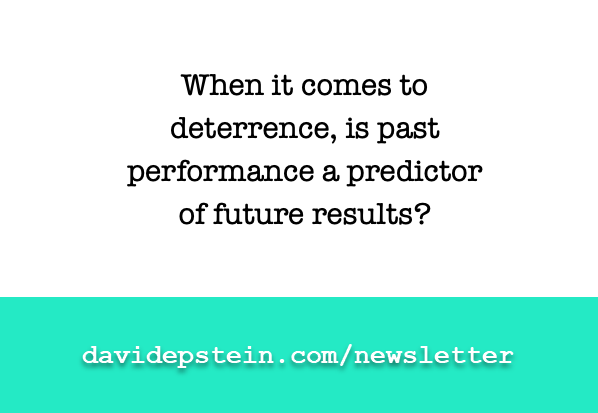
July 2, 2020
On March 25th, psychologist Anders Ericsson and I were both supposed to attend Angela Duckworth’s class at Penn, where she would start the day by discussing her famous grit research.
I critiqued certain extrapolations of grit research in chapter six of Range, and the idea was that Anders and I would share thoughts on the relative importance of things like grit, deliberate practice, early specialization, and talent. And by “share,” I mean probably debate. Anders did not believe in talent and was a proponent of the idea that a head start in narrowly focused practice was the ultimate advantage; I have argued for the importance of sampling, exploring different talents, and not specializing too early. When the pandemic intensified, we had to cancel our trips to Penn.
It didn’t seem like a big deal. Anders and I had had feisty exchanges before, and I figured we had more to come. So the news of his passing last month came as a total shock. I was crestfallen, which might seem strange given that our relationship was based on public disagreement.
My first book attracted attention partly because it criticized Ericsson’s work that led to the “10,000-hours rule,” particularly the argument that there is no such thing as talent. My second book attracted attention partly because it criticized the push for early hyperspecialization as the path to excellence in any endeavor, an argument in a raft of best selling books that focused on Ericsson’s work. And yet, Anders not only enriched the field of expertise research, he enriched my life.
Before I explain how, I want to note that Ericsson hated the moniker “10,000-hours rule,” even though it made his work world famous. He hated it so much that he wrote an open letter about it in 2012 and posted it on his faculty web page at Florida State. The title speaks for itself: “The Danger of Delegating Education to Journalists.” Yikes.
He expressed frustration at the idea of 10,000 hours as some magical threshold. The number came from a 1993 paper that Ericsson co-authored. It featured 30 violinists at a music academy, the 10 best of whom had accumulated 10,000 hours of “deliberate practice” on average by the age of 20, and were deemed by their instructors to have international soloist potential. The next 10 musicians were deemed potential pros as part of a symphony, and the bottom 10 were categorized as “music teachers.” In a nutshell, the paper concluded that the superior musicians had spent more time in what the researchers characterized as deliberate practice: solitary, cognitively engaged, effortful practice focused on error correction that “is not inherently enjoyable.”
The paper — which it’s safe to say is the most influential modern paper on skill development — was already a big deal when Malcolm Gladwell’s mega-smash Outliers made it world famous as the “10,000-hours rule,” the “magic number of greatness.” (You know an academic paper has reached crossover-star status when it inspires a Macklemore tribute. Which, I have to say, is catchy and motivating during interval sessions.)
In his “Danger of Delegating” letter, Ericsson wrote: “10,000 hours was the average of the best group; indeed most of the best musicians had accumulated substantially fewer hours at age 20. Our paper found that the attained level of expert music performance of students at an international level music academy showed a positive correlation with the number of solitary practice hours accumulated in their careers and the gradual improvement due to goal-directed deliberate practice. In contrast, Gladwell does not even mention the concept of deliberate practice.”
The fact that Gladwell doesn’t mention deliberate practice is a nitpick that probably wouldn’t have made a difference to non-scientist readers anyway. That said, the concept of deliberate practice is a huge contribution that Ericsson made to the study of skill development. Even though the definition of deliberate practice seemed to morph at times, Ericsson put an all-practice-is-not-created-equal stake in the ground.
Just mindlessly swatting balls at the driving range, for example, isn’t as useful as watching where a shot goes, noticing that it sliced, adjusting the club head and trying again to see if you can improve. To use the terminology of psychologist Robin Hogarth, which I featured in Range, I think part of what Ericsson was advocating was making a learning environment as “kind” as possible by looking for feedback after every attempt that informs the next step. He often said that, ideally, you should have a world class coach telling you what to do after each attempt at something.
Speed typing offers a fun example, I think, of Ericsson’s larger, conceptual principle. It turns out that if you just type a lot without thinking about it, you’ll get better, until you settle at a plateau in the 50-80 words-per-minute range. When I spoke with court reporters (they use different keyboards) who competed in speed contests, I learned that they too hit a plateau. To get off of it they’ll set a metronome a little faster than they can currently type and then keep up with it no matter how many mistakes they initially make in practice. Soon, they make fewer mistakes and get a bit faster and move the metronome again. After a year of tiny improvements, they’re way faster. Rather than settling at a comfortable plateau, they find a way to make practice effortful again.
What I took from Ericsson was the need to find ways to engage in effortful activity when you reach a plateau, rather than assuming you’ve topped out. Ericsson’s focus on the type of practice was a huge contribution. He set a research agenda that will bear fruit for years to come.
Still, as psychologist and creativity expert Scott Barry Kaufman (who, like me, had affection for Ericsson) pointed out, there was a huge caveat to the deliberate practice framework that was typically downplayed or left out entirely. Ericsson acknowledged in Peak, Kaufman wrote, that “the techniques of deliberate practice are most applicable to ‘highly developed fields’ such as chess, sports, and musical performance in which the rules of the domain are well established and passed on from generation to generation.” In Peak, Ericsson and his coauthor explain for the first time I had seen that certain areas simply “don’t qualify” for the deliberate practice framework, including “many of the jobs in today’s workplace– business manager, teacher, electrician, engineer, consultant, and so on.” Kaufman added that it leaves out “almost any creative domain.”
~~~~~
My most frequently recurrent disagreement with Ericsson was over what his work actually proved. Embedded in Ericsson’s framework was something known as the “monotonic benefits assumption,” which in this context means that there should be a perfect correspondence between the number of hours of deliberate practice someone has put in and their skill level. So if two people who started from scratch each put in a thousand hours of deliberate practice, they should be at the exact same performance level. But in skill acquisition research, this turns out never to be the case except in simple tasks that never change. People tend to progress at different rates even given the same practice. And there is evidence of that even in Ericsson’s famous paper.
Think back to the “Danger of Delegating” letter. Ericsson’s own criticism of the “10,000-hours rule” explains that most of the top musicians in his study had not accumulated 10,000 hours. But the original paper did not include raw data or any measure of variance, so it was impossible to tell how much they actually accumulated. It only gave an average, which by its very nature obscures individual differences, so how was anyone to know how much the musicians had actually practiced? To give chess as an example, a study found that it takes 11,053 hours on average to reach international master status in chess, but one player made it in 3,000 hours, and another needed 23,000 hours. So you can have an “11,053-hours rule,” but it doesn’t tell you much about the reality of human skill acquisition. Giving only an average tells a misleading story.
In 2012, the same year he wrote the “Danger of Delegating” letter, I invited Ericsson to join a panel on talent and skill development that I co-organized at the American College of Sports Medicine annual meeting. He graciously accepted. That day, he was asked to explain how much variation there was around that 10,000 hours average for the top musicians in the famous study. He answered: “Well, what I would say is that obviously when you’re only collecting data on 10 individuals, and also it’s shown that when we had them keep [practice] diaries, and also do some of the retrospective estimates several times, that there’s no perfect agreement.” That is, the musicians were inconsistent in their accounts of how much they had practiced.
The person asking the question, physiologist Tim Lightfoot, replied: “Many of us in this field have dealt with the validity of recall surveys as well, but I don’t ever recall a publication in any of our journals leaving out standard deviation because they said it wasn’t valid. And so I guess I’m still kind of curious as to what is, even if it is flawed, what was the variation that you saw around that 10,000 hours?”
Ericsson replied that “it was certainly more than 500 hours.” It later emerged that it was much more. Not only that, but some of the merely good musicians had actually logged more deliberate practice than some of the great ones, so the idea of perfect correspondence between deliberate practice and performance level did not hold.
After that ACSM panel, despite the contentious back and forth, Ericsson joined all the panelists for a dinner where the discussion continued. It was energetic, fascinating, and civil. The day was just about my fantasy of productive discourse: earnest disagreement in a formal setting followed by earnest disagreement coupled with humor and food and promises to follow up with data in an informal setting. I went home with a massive reading list.
As he did that day, Ericsson put practice at the center of research on skill development, and inspired an enormous amount of subsequent work. He always argued passionately, and he argued clearly so that one knew what they were up against. I don’t once remember in either our public or private exchanges seeing him resort to ad hominem attacks. Sometimes he frustrated me by ignoring contradictory work; other times I eagerly used principles from his work to improve myself, especially my memory. I valued both of those sides, and made use of them.
Once, when I got stuck in the writing of Range, I took an online beginner’s fiction writing course. I suddenly felt completely incompetent, and it was a mini-revelation for me. It made me realize that I was using way too many quotes in my book manuscript. I went back and replaced tons of quotes with more clear narration, and the book is better for it. Ericsson wouldn’t have counted a fiction class as deliberate practice because it wasn’t tightly focused on my nonfiction goal, but, to me, it adhered in a way to the conceptual spirit of his work; I was seeking discomfort in order to get off a performance plateau.
I wish I could argue over that experience with Anders. I liked knowing that we’d inevitably cross paths now and again. I hope he would have smirked to know that my idea of honoring him was to do what I just did above — continue grappling with our generative disagreements. Rest in peace, Anders Ericsson.
Thanks so much for reading the Range Report. If you have a friend who might enjoy this free newsletter, please consider sharing. They can subscribe here. Until next time….
David


